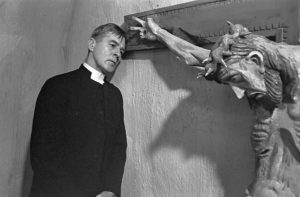 If you haven’t seen Winter Light, a 1963 Ingmar Bergman film, you should. It’s available on youtube. You can invest an hour and fifteen minutes now, and have a distillation of the views that many have of Christianity today.
If you haven’t seen Winter Light, a 1963 Ingmar Bergman film, you should. It’s available on youtube. You can invest an hour and fifteen minutes now, and have a distillation of the views that many have of Christianity today.
The primary figure in the movie (“protagonist” doesn’t seem apt) is Tomas, a disaffected and disillusioned clergyman conducting a communion service for a sparsely-attended church. For most of the movie he is in a state of depression over his loss of faith. At one point he refers to a well-worn wooden crucifix as a “ridiculous image,” and when he gives up on his faith at last—or seems to—he says of himself: “free at last.”
Tomas nonetheless attempts to minister to one of his parishoners, Jonas Persson, who Tomas correctly understands as being on the edge of suicide. Tomas’ admonition that Persson “trust God” is unconvincing, and in fact Tomas self-indulgently uses the occasion to confess his own loss of faith.
 Tomas misses something important about Persson’s depression, however. Persson does not suffer from situational depression, but rather from existential anxiety. Persson had suggested that his concern was China getting the bomb, but this Swedish fisherman’s depression wasn’t circumstantial. His finances were adequate. He was having a new boat built. He had 3 young children, and one on the way. He was married to a lovely and caring young woman. And yet, Tomas in his bungling misanthropic way drily counsels as if Persson’s anhedonia were a function of Persson having read a newsclip about China.
Tomas misses something important about Persson’s depression, however. Persson does not suffer from situational depression, but rather from existential anxiety. Persson had suggested that his concern was China getting the bomb, but this Swedish fisherman’s depression wasn’t circumstantial. His finances were adequate. He was having a new boat built. He had 3 young children, and one on the way. He was married to a lovely and caring young woman. And yet, Tomas in his bungling misanthropic way drily counsels as if Persson’s anhedonia were a function of Persson having read a newsclip about China.
Persson’s real problem is that he doesn’t know why he should bother to live. Persson needs reassurance that there is something beyond this present existence—that there is a God. He needs to know that he is more than a product of purposeless and meaningless physical processes. When Tomas confesses that he, Tomas the clergyman, does not believe, Persson immediately goes out and kills himself.
Persson killed himself over what Albert Camus cited as the one truly serious philosophical problem: suicide. “Judging whether life is or is not worth living amounts to answering the fundamental question of philosophy.” Persson’s was an existential dread.
Some people deal with the loss of faith by bootstrapping meaning from some source that doesn’t really supply it. Perhaps with transient hedonism; perhaps by pretending the wonders of the physical cosmos somehow provide their own meaning; perhaps by walling off the implications of the materialist outlook.
Others, however, lack the self-defense mechanism of evasion. The character Jonas Persson would be one of those people. He has come to a representative of Christ’s church for an answer to the question whether there is a God. He is told “no.” It is then obvious to Persson (“Persson” mind you) that there is no meaning to anything, not even love. Not even love for his wife and 3; almost 4, children. There is really no reason to live, for this fisherman who asks the philosopher’s fundamental question.
Stay tuned, we’ll have more to say about Winter Light.

2 thoughts on “Winter Light — Jonas Persson”